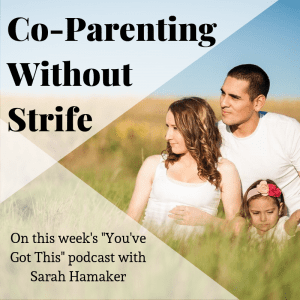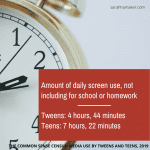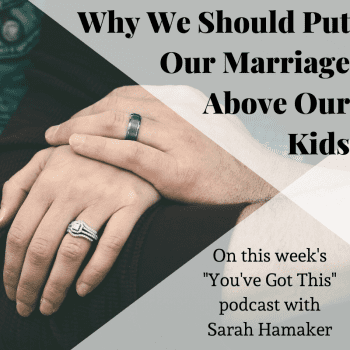
The following is an excerpt from my interview with Paige Harley on my podcast, “You’ve Got This.”
Paige is mediator and divorce transition consultant based in Nashville, Tennessee, but with clients from all over the world. She is child-focused and works with individuals and families navigating the challenging waters of divorce and post-divorce. She is a single mom herself and has been co-parenting her three kids ages 20, 17 and 15 for more than a decade. If interested in working with Paige, she offers a free 30-minute consult.
Unfortunately, divorce is part of our societal landscape. For whatever reason, people get divorced and many times there’s children involved. Co-parenting gets more tricky when you have separate households.
Paige: Co-parenting is what you did before the divorce, trying to figure out how to choose make decisions for the child, like braces, education, extra-curricular activities. But with a divorce or separation, it becomes really challenging when you’re now in two homes and oftentimes people aren’t prepared for that and they aren’t prepared for the amount of work.
We were talking about what would be a 15-second conversation between married partners becomes a much bigger deal when you have separate homes. It becomes so complicated and people aren’t prepared for that, and sometimes I think that builds resentment. It’s exhausting being a single parent.
Co-parenting is even harder because you don’t have the benefit of just doing things on the fly. You have to be a lot more intentional. It takes more time and effort. No one’s telling you this when you’re signing the divorce papers. You’re just trying to keep your head above water.
We need to find ways to delegate some of the responsibilities. Especially as moms, we tend to do everything that we always did but now we have more responsibilities as a single parent when you’re in two homes. Your workload does increase, and then if you are the primary parent which a lot of moms are, then the workload has even gotten harder.
When I can talk to families, either currently going through divorce or shortly after whatever, I tell them that this is a great opportunity to figure out what has been working and what isn’t working because whatever frustrations you had when you were co-parenting under one roof, they’re going to be increased when you go under two roofs.
We shouldn’t automatically think the worst of the other person because that just can really escalate something. It can be hard if the divorce had a lot of hard feelings or was messy. How do you help parents to put that aside?
Paige: I say, “Give yourself a lot of grace.” I talk about the pendulum that swings on both sides. Give yourself some grace in navigating through that and get feedback from people that you really trust. Don’t go to the friends you know are just going to be your yes people. Go to the people who are going to make you look at yourself too.
Where I find people get into these protracted conflicts is nobody’s asking questions. So, if you can be the one who asks questions, “Tell me more about why are you so adamant that you don’t think that the kids should go to the private school? Is it the school? Is it the money? Help me understand.” You can’t find the solutions until you really understand what the barriers are and why.
Oftentimes I find that people made assumptions like, “He doesn’t want to because he’s cheap and he’s just saying it’s not worth it,” and it’s like no, that’s not it at all. He doesn’t like it because of the drive or the schedule or something else.
So ask the questions, foster curiosity, and then be the one who’s looking for the solutions and offering those up instead of trying to always make your case and being like two attorneys and just fighting for your cause. Ask, “What if I did this? I’m not saying I would but what if I was willing to pay for it? What if we tried it for a year and then we could reassess?” Whatever you’re willing to do, don’t limit yourself by getting your own self stuck and just saying, “It has to be this.”
A good reminder that it’s not about getting our way, it’s more about trying to do what’s right for our kids. That’s hard. I mean, it’s hard when your co-parent lives in the same house with you, and I can’t imagine how much more difficult it is when you’ve separated and you have to have two households now and two different ways of doing things. And you may not agree with all the thing that your other co-parent is doing and yet you still are called to do the right thing with your kids and you still need to put them first in those decisions.
Paige: I think the most important piece of advice that I got when I was going through my divorce and that I give to everyone is that all the research shows at the end of the day how you gauge how well your children come to your divorce is how comfortable do they feel when you’re both in the same room at the same time. If you can keep in mind the story I want my kids to say about our divorce and post-divorce when they’re in their forties, that will help you in these decisions.
That’s going to mean that there is going to be very few things that are really going to be important enough to fight for your way. Keep in mind the big picture.
I’m a marathon runner so I use a lot of running analogies but in this case, it really is a marathon and we can get so caught up in the little things. And then that brings up one final thing I should say about that is making sure that you’re not involving your kids in between the decisions. Again, best you can, the same principles that apply to co-parenting in the same home apply to co-parenting in two homes. I think that there are nice and kind ways that you can speak about your co-parent to let your kids know you’re not throwing their dad under the bus.
For instance, if they know I’m advocating for them to be on the travel soccer team and they know their dad doesn’t want them to be, we don’t want to cause friction between our kids and their father. So we might say, “Your dad doesn’t agree with it. I don’t know if I necessarily agree with him but for now, we’re going to have to let this go and we’ll just see what comes back up. Let’s find some alternatives. Let’s do this. Let’s keep you on this team here.” That is modeling for your kids how to deal in those difficult situations, that is life. Things don’t go our way and that’s okay.
I think that is such good advice for even when you’re married to your co-parent and you live in the same house. There are times when you disagree and showing our children how to compromise. Because we can’t all get what we want—that is just not how life works. And the more we can kind of model that and say, “You know, it’s okay. Maybe we will revisit that travelling soccer team,” to use your example, “but right now, your dad said for whatever reason, we can’t afford it right now, it’s not good for our family even though maybe I thought it was going to be good.” It’s important to kind of help them know how to deal with those disappointments, deal with those changes. And even sometimes we’re wrong. We’re going to be wrong as parents. Co-parent in the same house or not, we’re going to be wrong and I think we just keep that in mind too, maybe a little less likely to kind of push our agenda all the time as well.
Paige: It’s really not going to be the end of the world if little Johnny doesn’t do the travel soccer team. It’s amazing how we put value on these things that at the end of the day don’t matter. It’s more important to let your children feel safe, let them feel loved by both parents, show them how to honor the other parent, how to honor someone even if the situation might be tough or whatever. There’s just ways to do that and they are looking to you to model that.
Remember, for co-parents, little things like sitting together at events are very important to kids. So best you can, do things like that with your co-parent. Sit together at recitals and games. You don’t have to like each other. You do not even have to talk to each other. But simple things like that are sending a message. Try to be cordial, try to be honoring even if it’s hard and there’s maybe a new person in the other person’s life—you’re doing it for your child.
Understanding again, keep in mind at all times, I want my kids to feel good with us being in the same room at the same time, and they can sense when you don’t. So try to work on what that looks like for you. If it’s truly better that you don’t sit together because you can’t be nice, then don’t sit together but have some ultimate goals and work towards those. Challenge yourself to say, “I really want my kids and what’s the story I want them to say about how it was to be a child of divorce,” because no one got married to get divorced. You didn’t want this to happen. It wasn’t a vision that you had. You’re disappointed, your spouse is disappointed. But how can you make the best of the situation? Because it’s real easy to let it get icky and ugly, but don’t let your kids have that.
Make sure that you’re doing everything you can as a mom especially to bridge that. It is our job to help bridge that naturally. It’s just kind of the design of how men and women are a little bit different.
To hear more great advice and stories from Paige, listen to “Co-Parenting Without Strife” on the “You’ve Got This” podcast.












